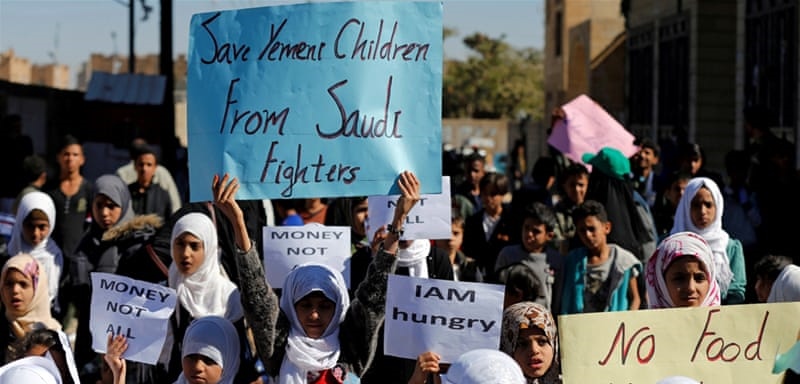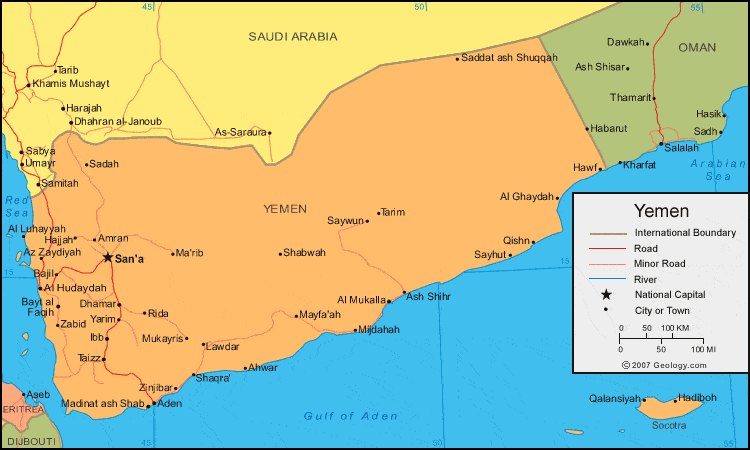Yemen’s humanitarian crisis
November 27, 2017 | Expert Insights

Nearly three weeks after a Saudi Arabia led blockade cut off humanitarian aid to Yemen, about 25,000 tonnes of wheat will be offloaded for starving people in the country.
The aid, which will be supplied on November 27, 2017, will be the first food aid allowed into a nation that is facing mass famine.
Background
The modern Republic of Yemen is a relatively new state. Prior to becoming the modern state of Yemen, several dynasties emerged from the ninth to 16th centuries to rule the region. The most powerful one was the Rasulid dynasty. In early 20th century, the country was divided between the Ottoman and British empires in the early twentieth century. South Yemen became a communist country and North Yemen remained traditional to its roots. In 1990, the two regions merged.
Yemen, one of the world’s poorest countries in the world, has been devastated by the war between forces loyal to the internationally recognized government of President Abdrabbuh Mansour Hadi and those allied to the Houthi rebel movement. The Yemen Civil war began in 2011 with the Arab Spring protests that led to the fall of the then President Ali Abdallah Saleh on charges of corruption and economic grievances. Hadi, his deputy minister at that time, took over the region. However, the increasing political instability in Yemen paved the way for the Houthi, representing the Shiite minority to take over the territory.
A military intervention was launched by Saudi Arabia in 2015, to influence the Civil War in Yemen. A two-year Saudi-led campaign has damaged infrastructure and caused shortage of medicine in one of the most poorest Arab country. Reports have also emerged that there are players within Yemen who actively sponsor terrorism by funding activities conducted by ISIS.
The Saudi-led coalition has been carrying out air strikes against the Houthi rebels for more than 2 years now. Since then the country has been plunged into a civil war in which the exiled government backed by Saudi Arabia is trying to defeat the Houthi group aligned with Iran.
In March 2017, 22 people died and several were wounded because of a Saudi-led attack in western region near the Red Sea fishing town of Khoukha. The Yemen war has led to 10,000 deaths and more than 3 million people have been displaced. According to United Nations Food Program, nearly half of Yemen’s population is on a verge of famine.
In November 2017, Saudi Arabia has reported that the region’s military had intercepted a Yemen-borne ballistic missile over Riyadh. Saudi Arabia has stated that Iran has armed the rebels in Yemen – a charge denied by Iran. After the missile was intercepted, Saudi Crown Prince Mohammed bin Salman said providing rockets to the rebels "may be considered an act of war". A Saudi-led coalition closed land, air and sea borders.

Analysis
Nearly three weeks after a Saudi Arabia led blockade cut off humanitarian aid to Yemen, about 25,000 tonnes of wheat will be offloaded for starving people in the country. The aid, which will be supplied on November 27, 2017, will be the first food aid allowed into a nation that is facing mass famine.
A spokesperson for the World Food Programme (WFP), Abeer Etefa has confirmed the news that the food has been given clearance to dock.
UN and other aid agencies have been unable to provide urgent humanitarian supplies to Yemen endangering the lives of millions. The International Committee of the Red Cross has revealed that Sanaa, the country's capital lacks clean water. A shortage of fuel caused by the Saudi-led blockade has caused pumping stations to shut down. The nation is also in the midst of the worst outbreak of cholera recorded.
The UN has stated that the key port of Hudeida in the region has remained closed. It is the main conduit for UN-supervised deliveries of food and medicine. The agency has said that 1.9 million doses of vaccines have been flown into the country. However, two UNICEF vessels carrying urgent supplies including water purification tablets as well as food have not been clearance to dock.
UNICEF director Geert Cappelaere said, “We hope all will live up to their promises. These supplies are urgently needed. "Today it is fair to say Yemen is one of the worst places on Earth to be if you're a child. The war in Yemen is sadly a war on children. Yemen is facing the worst humanitarian crisis I have ever seen in my life.”
Assessment
Our assessment is that there is an unprecedented humanitarian crisis unfolding in Yemen. The lives of millions in the country hangs in the balance as the blockade threatens to keep basic aid such as medicine and food from the region.








Comments